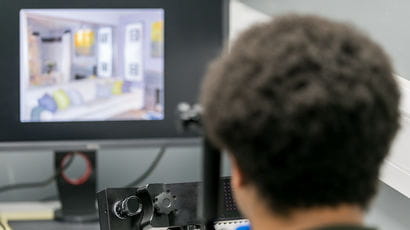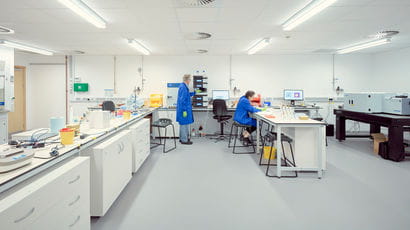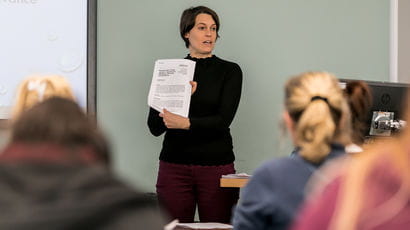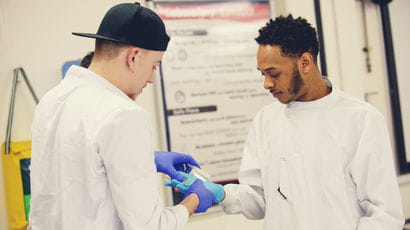Professional development
Professional development and research training requirements for postgraduate researchers at UWE Bristol.
Regulations
The relevant regulations are B4 and E7.
Regulations can be viewed in full in the Academic regulations 2025/26 (PDF).
Credit requirements
Overview
The Academic Board of the University adopted a new framework for the definition of doctoral degrees, this was produced in response to the increasing diversity in patterns of doctoral provision across UK universities and indeed internationally.
As part of the project registration process (CP1), the Director of Studies will identify the particular development needs of an individual student. This must be reviewed annually as part of progress monitoring as a student’s development needs may develop during their studies.
Module options
Students can register on any Masters (M) level module at UWE Bristol through the Doctoral Academy Hub.
It is expected that the credits taken will address the broad areas of researcher development, skills development and could include subject specific knowledge.
The module specifications page will provide you with a list of UWE Bristol modules that you can filter by level of study (for example M level).
Additionally, we have compiled a list of modules (PDF) which have been previously taken by PGR students, which may help in identifying suitable learning opportunities. Please note that module availability changes, therefore please check on the module specifications link above as to whether the module is running this year.
Advanced Specialist Text Study
The Advanced Specialist Text Study module (PDF) has been designed for postgraduate researchers specifically in the College of Arts, Technology and Environment.
The PGR degree student will be able to demonstrate knowledge and critical understanding of the content of an advanced specialist text that has been identified as relevant to the PGR thesis topic by the Director of Studies of the PGR degree student. The chosen text must be approved in advance by the College Research Degrees Committee.
Minimum credit requirements
As part of this framework, all research degree programmes are now required to include the acquisition by the student of a minimum number of credits at Masters (M) level.
For PhD and DPhil students, there is also an opportunity to take additional modules (without additional tuition fees) up to a maximum number of credits, as below:
| Award | Minimum credits | Maximum credits |
| Master of Philosophy (MPhil) | 60 | 60 |
| Doctor of Philosophy (PhD) | 60 | 120 |
| Doctorate by Publication (DPhil) | 60 | 120 |
Students studying for a Professional Doctorate will achieve their credit requirement as part of the taught element of their programme.
Please note: An existing Masters qualification is not an automatic substitute for credits on research degrees.
Procedures about professional development and training
Assessed professional development and research training
This procedure relates to regulation E7.
- The purpose of the assessed programme of development is to enable Postgraduate Researcher (PGR) candidates to meet the requirements of the UWE Bristol MPhil or Doctoral descriptor and become effective researchers, and to increase awareness of skills transferability in the wider labour market. Modules selected for this programme by the candidate and their Director of Studies (DoS) should include learning objectives which align to the aims and objectives of the Vitae Researcher Development Framework.
- All PGR candidates must achieve the minimum credit requirement specified for their award, but it is recognised that some PGRs will benefit from undertaking research training beyond the minimum required and up to the maximum specified to enable them to reach the requirements of the relevant descriptor for their award.
- Masters level modules may be taken from any College or School with the agreement of the DoS that they are relevant to the research project being undertaken and the skills or knowledge required to achieve it. These modules may form part of taught awards at Masters level within the University, in which case they are not run specifically for PGR candidates and are not guaranteed to run every year. Candidates should check with the module leader before registering on the module. Information on modules can be found via the UWE Bristol module specification search function.
Accredited prior learning (AL)
The student should note their intention to claim AL on the CP1 form at the project registration stage. Once the project has been confirmed by the designated person, the student will need to make a separate application for AL recognition.
Details on how to apply for AL can be found on the accredited learning webpage.
Accreditation of learning (AL) and experiential learning (AEL) in MPhil, PhD, and MPhil or DPhil by publication awards
This procedure relates to regulation B4.
- PGR candidates wishing to offer previously accredited learning (AL) or experiential learning (AEL) towards some or, occasionally, all of credit requirement for their award must do so in accordance with regulation B4.
Accreditation of learning (AL) and experiential learning (AEL) in professional doctorates
This procedure relates to regulation B4.
- Where prior learning (AL or AEL) contributes to the credit requirements of a professional doctorate, this must be in accordance with the relevant limits set out in regulation B4.
- Where a professional doctorate candidate fails to meet the requirements of the award on which they are registered but is eligible to receive the specified lower or interim award, the AL or AEL limit for that award will apply as set out in regulation B4.
Processes for considering and reporting AL and AEL to examining boards
This procedure relates to regulation B4.
- The Doctoral Academy has an established process for the scrutiny and verification of applications for recognition of AL from PGR candidates. During 2023/24 this may be devolved to University Colleges or Schools using processes in accordance with regulation B4. PGRs are advised to follow the latest advice provided by the Doctoral Academy when applying for recognition of accredited learning.
- AEL requires the matching of the learning achieved through experience by the PGR candidate to the learning outcomes of a specified UWE Bristol module, and must be executed in accordance with regulations at B4. Processes for the consideration of AEL are the responsibility of the University College or School in which the module sits.
- Credit awarded to PGR candidates for accredited learning or accredited experiential learning used previously to contribute to a different award will not carry marks in accordance with regulation B4. The module outcome will be pass or fail.
- All recommendations to recognise AL or AEL will be confirmed by the designated examining board in accordance with regulation B4.
The Vitae Researcher Development Framework (RDF) is used as a basis for the PGR candidate's development needs analysis. Use of AL against Masters-level project/dissertation modules that do not have explicit learning outcomes related to methods, communication, philosophy or governance will only be approved if there is a particular justification when mapped against the RDF.
Procedures about PGR candidates who teach
- UWE Bristol strategies identify research activity, output and knowledge exploration as key to informing and enriching its taught curricula. PGRs have the potential to play a significant role in supporting learning and teaching in this respect and the Doctoral Academy has developed a policy for PGRs who teach (PDF) which underpins this aim. This policy provides more detailed information about how and when to teach including:
- Contribution to teaching by PGRs can only occur with the permission of the DoS and must not impede progress on the research degree.
- Teaching commitments for full-time PGRs may not amount in total to more than 120 hours per academic year (PGRs who teach for more than 120 hours per year must be registered on their research degree award part-time).
- PGRs who teach must undertake the training made available by the University that is appropriate to the number of hours that they teach per year.
Further information about the Research Skills Development Programme
'Invest in Yourself' is UWE Bristol’s comprehensive programme of researcher development workshops, activities, and resources for researchers at all career stages from PGR onward. Taking part helps PGRs make the transition from student to researcher, while becoming part of UWE Bristol’s research community and culture.
The programme is updated annually and we always welcome suggestions for improvement. Please see our Research Skills Development page for current programme details.
Doctoral Academy Handbook sections

Introduction
Read an introduction to the UWE Bristol Doctoral Academy Handbook.

Research degree awards
The different postgraduate research awards available and the qualification descriptors they align to.

Student registration
The registration process and periods of active study for postgraduate research degrees.

Professional development and training requirements
Professional development and research training requirements for postgraduate researchers.

Supervision
The role and responsibilities of the supervisory team for postgraduate research.

Research project
The confirmation of the research project (CP1) is where arrangements for the start of the project are confirmed.

Research governance
Research governance for postgraduate research degrees, includes ethics, research data management, intellectual property, conduct and assessment offences.

Personal circumstances
Personal circumstances, reasonable adjustments and other support available to postgraduate researchers.

Progression examination: stage one
The progression examination viva and report submission.

Progress review: stages two and three
The progress review, options for evidence of progress and eligibility for the completion period.

Final submission
Requirements for preparing and formatting the final submission for Doctoral or MPhil level research awards.

Examiners
The University’s expectations of postgraduate research degree examiners and Independent Chairs.

Final examination
The final assessment for Doctoral or MPhil level awards by research.

Higher doctorates
The regulations and processes for eligibility, consideration, submission and awarding of higher doctorate awards.
